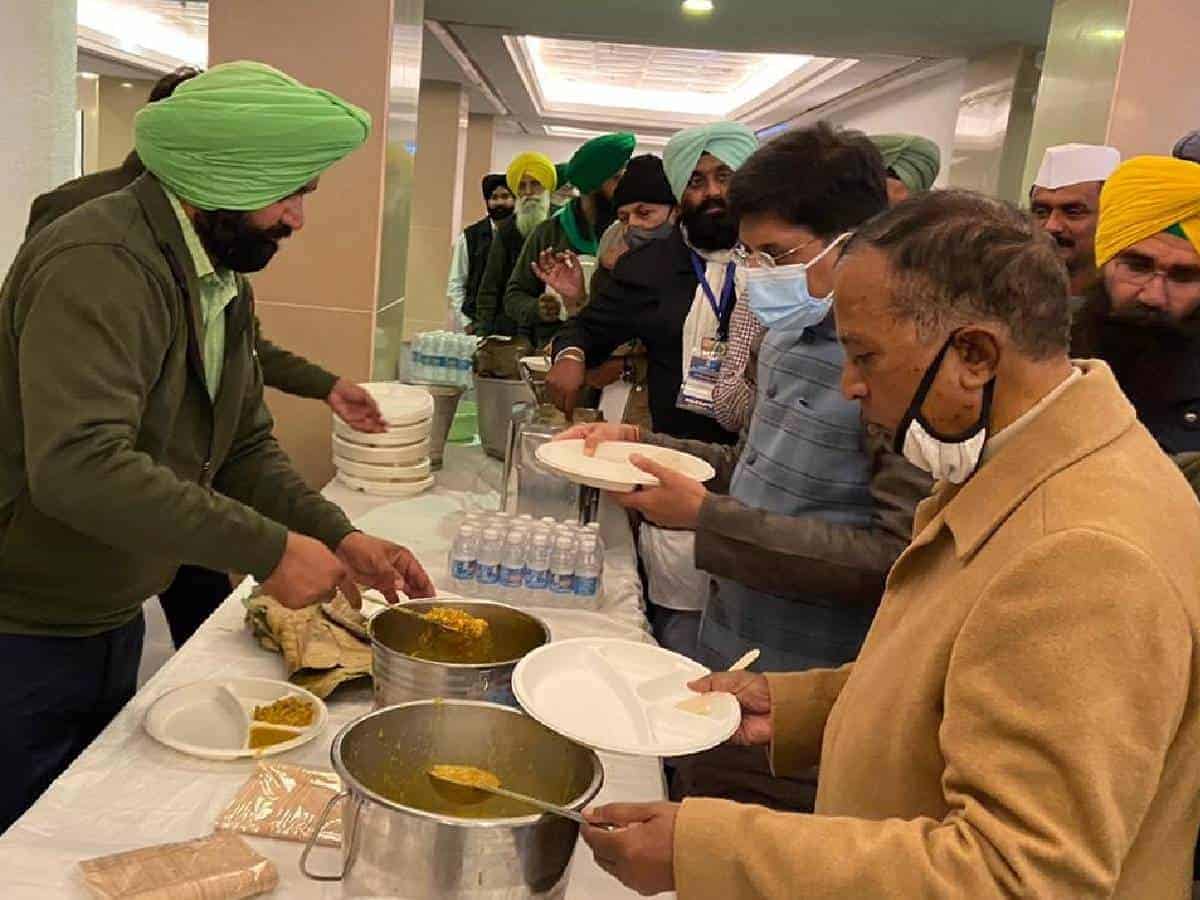New Delhi: Three union ministers joined farm leaders on Wednesday to share ‘langar’ food arranged by protesting farmers during their sixth round of talks to resolve the deadlock over new farm laws.
The ‘langar’ (community kitchen) food arrived in a van at the meeting venue, Vigyan Bhawan, after around two hours of discussions had taken place and the two sides took a break for tea and snacks.
Sources present at the venue said that Agriculture Minister Narendra Singh Tomar, Food and Railway Minister Piyush Goyal and Minister of State for Commerce Som Parkash joined the farmer leaders to share their langar food during the break.
Farmer leaders said that the talks were continuing and they were going ‘agenda wise’.
During the last few meetings, farmer leaders have been arranging their own lunch, snacks and beverages while refusing to have the food organised by the government.
At one such meeting, farmer leaders had even invited the ministers to langar at their protest site on Singhu border.
Before start of the meeting, some union leaders had said farmers in some parts of the country are being forced to sell crops including paddy below the Minimum Support Price as market rates have fallen and asserted that the agitation will continue till the government agrees to their demands.
“After new farm laws were implemented in Uttar Pradesh, prices of crops have fallen by 50 per cent. Crops are being bought at below MSP. Paddy is being sold at Rs 800 per quintal. We will raise these issues in the meeting,” Bharatiya Kisan Union (BKU) leader Rakesh Tikait told reporters.
“We will not leave Delhi till our demands are met. We will celebrate New year at borders” he said.
Punjab farmer leader Baldev Singh Sirsa came for the meeting carrying placards of media reports of fraudulent cases reported in Guna and Hosangabad after implementation of the new laws.
“We don’t have any new agenda. The government is maligning us by saying farmers are not coming for talks. So we gave December 29 date for talks. We have given them our clear agenda but the government is insisting that laws are beneficial for farmers,” Sirsa said.
Showing media reports, he said more fraudulent cases are being reported after the implementation of the new laws and these issues will be raised in the meeting.
The meeting between three union ministers and representatives of 41 farmer groups began at around 2.30 pm at Vigyan Bhawan.
Tomar is heading the government side, which also included Goyal and Parkash, who is an MP from Punjab.
The sixth round of talks between the two sides is being held after a huge gap. The fifth round of talks was held on December 5.
The protesting farmer unions are sticking to their position that the discussions will only be on the modalities of repealing the three new agri laws and giving a legal guarantee on the MSP among other issues.
On Monday, the Centre invited the unions for the next round of talks on December 30 on all relevant issues to find a “logical solution” with an “open mind” to the prolonged impasse over the three new agri laws that were enacted in September.
But in its letter on Tuesday, the Samyukt Kisan Morcha, the umbrella organisation which represents the farmer unions, said the modalities for repealing the three contentious laws and a legal guarantee on minimum support price (MSP) must be part of the agenda.
The sixth round of talks was originally scheduled for December 9 but it was called off after an informal meeting of Home Minister Shah with some union leaders failed to reach any breakthrough.
The government had, however, followed up Shah’s meeting with a draft proposal sent to these farmer unions in which it had suggested 7-8 amendments to the new laws and written assurance on the MSP procurement system. The government has ruled out a repeal of the three agri laws.
Thousands of farmers, mainly from Punjab and Haryana, are protesting at various borders of the national capital for more than a month against these three new laws.
The government has presented these laws as major agriculture reforms aimed at helping farmers and increasing their income, but the protesting unions fear that the new legislations have left them at the mercy of big corporates by weakening the MSP and mandi systems.

